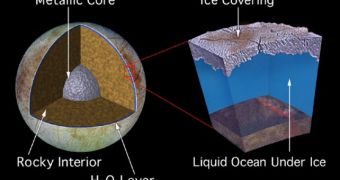In a new set of investigations carried out on Jupiter's moon Europa, researchers determined that its underground oceans contained vast amounts of the chemical oxygen, which is widely considered to be absolutely necessary for life as we know it. The team behind the study says that the element may be present in such high concentrations that it could allow for millions of tons of fish to live happily there. Just to clarify, astrobiologists are not saying that the Jovian moon supports life, or that fish actually swim in its oceans. What scientists are saying is that the place could support life, even if only in microbial form, Space reports.
Studies conducted on the object have revealed the existence of an underground ocean just below the surface, which may have a depth of no less than 100 kilometers. Europa itself is about the size of the Moon, and its surface is made up of a thick ice crust. The exact dimensions are not yet known, but astronomers are convinced that the structure is fairly thin, several miles at most. With the new discovery, old speculations that the moon may contain life are bound to reappear, but now with more grounded reasons. The possibility is made even more valid by previous researches on the influence that Jupiter itself exerts on all its natural satellites.
Data would seem to suggest that the gas giant bombards its moons with massive amounts of radiation. In the case of Europa, these radiations are believed to be interacting with the ice, in order to form free oxygen and compounds such as hydrogen peroxide. This type of increased reactivity may be the exact process scientists have been looking for in their predictions. Phenomena such as this one, astrobiologists say, could be the key to life emerging on Europa. And they're not talking about simple lifeforms either, but about self-replicating multi-cellular organisms, that could grow in complexity similar to how early life developed on Earth.
Drawing additional parallels between the moon and our own planet, the researchers say that the oceans on the space object most likely received enough oxygen to support the development of life 1 to 2 billion years after the moon formed. This is roughly the same amount of time early life on Earth had to struggle with oxygen deprivation. If we trust this line of thought, then it follows that lifeforms have an equal chance of having developed on Europa as they did on Earth. Here, they had more appropriate conditions to do so, but that's not to say that it's impossible for the oceans under the surface of the Jovian moon to be teeming with life.

 14 DAY TRIAL //
14 DAY TRIAL //